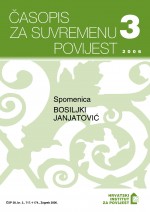Euharistijski kongresi u Chicagu (1926.) i Zagrebu (1930.) u sustavu političke represije
Euharistic Congresses in Chicago (1926) and Zagreb (1930) in a System of Political Repression
Author(s): Jure KrištoSubject(s): History
Published by: Hrvatski institut za povijest
Keywords: Eucharistic Congresses; Repression; Catholic Church; Kingdom of Serbs; Croats and Slovenes/Yugoslavia
Summary/Abstract: Two Eucharistic congresses deepened the awareness of the repressive bodies of the Kingdom of Serbs, Croats and Slovenes/Yugoslavia. The first is the Eucharistic congress which was held in Chicago in 1926. The second one was organized by Archbishop Antun Bauer in Zagreb in 1930. The purpose of this reminiscence is not to examine the spiritual message of these eminently religious occasion, rather to recollect the political atmosphere in which they were held. The situation at the time for Croats and especially the Catholic clergy was, generally speaking, not enviable, it was substantially worsened by the introduction of the royal dictatorship in 1929. Many, for instance, ended up in court or suffered beatings from the gendarmes for such innocuous reasons as carrying the Croatian tricolored flag. Police surveillance of the people was increased, and Catholic clergy in particular found themselves being watched. While the congress in Chicago drew the attention of the state authorities due to their fear that the pilgrims from Croatia would be exposed to the negative influence of Croatian emigrants, the Eucharistic Congress in Zagreb in 1930 was characterized by police surveillance and harassment by gendarmes. This work is based on police reports about the preparations for the congress and the surveillance of certain priests and politicians. As revealled by the police reports, priests had been followed before. The Congress was nevertheless a peaceful manifestation of the Catholic faithful at which not the least political incident occurred. The faithful were certainly aware of the political implications of the religious congress without going so far as to provoke a drastic reaction from the authorities. This did not prevent the proponents of Yugoslav integralism from continuing their attacks on the Eucharistic Congress or the Catholic Church in general, of which their is some evidence.
Journal: Časopis za suvremenu povijest
- Issue Year: 38/2006
- Issue No: 3
- Page Range: 921-937
- Page Count: 16
- Language: Croatian

